T-Money
Conquestador
Here we go again.. 
Settings:
Random opponents, Warlord modded to a bit more difficult, Normal Aggression, "standard" world.
Chapter One: The Beginning
Many people say that the Zulu empire was the first true civilization, the first point at which cro-magnon man crossed the fine line into intelligence and rational thought. Until recently, not much was known of the Zulu empire or how it came to be. All that was known was that which was found in the ruins of their great cities. But now, a veritable treasure trove of evidence has been discovered. This evidence is in the form of letters of correspondence, maps, plans, and journal entries. I will relate these to you as best I can.
Nobody is sure exactly when the Zulu empire began, but most estimates point to around 4000 B.C. Around this time, the ancient Zulu scripts say, there was a weak city, nothing more than a miniature sprawl of tents and huts, huddled together among a hilly landscape. This city, however weak it was, is the first known sign of true civilization. In this city, people came together and settled down, subsisting on crops instead of following their favorite game around as they had for so many years. This city was named after the man who would soon shape it into a great pillar of civilization. This city was called ZimBobwe, which translates literally into English as "City of the Bob."
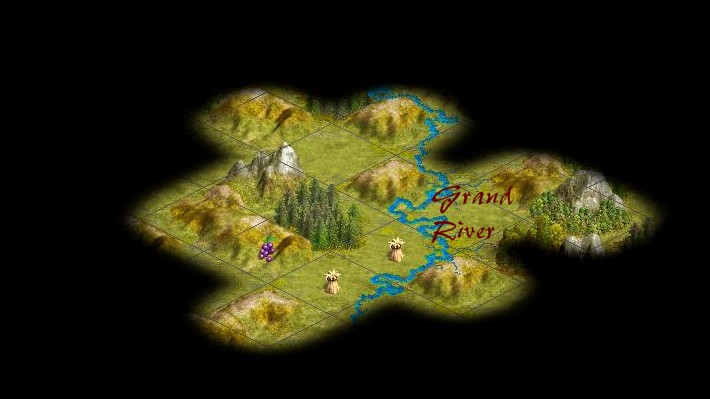
The man who was responsible for the rise to greatness of the Zulu empire is a mysterious figure. Until the Zulu empire began to become a superpower, not much is recorded of this man in terms of...his name. The only times his name is written down, it translates into English text as this: Mbawmb. Various historians and linguists have proposed the pronunciation of this name as um-BAW-UM-be, um-BAW-b, and even UM-ba-WUM-ba. Umbawumba? I don't think so. As a rule, most historians agree use the simplified pronunciation of Bob when discussing this great man.
But enough about his name. Bob brought the Zulu empire to power, and he started this the way these things always start: from the bottom. He was a simple warrior/hunter for his people when they settled on the fertile plain of the Grand River, but soon tales of his bravery and intelligence spread, and when the people decided to stay put for good, he was the natural selection as the "big man" of the city. Bob ended interclan bickering, promoted settlement of the surrounding land, and supervised all expansion of the fledgling city. It is widely accepted that if this man had not risen to be ruler of the Zulu, they probably would have died out like so many other nameless ancient clans.
Soon after the city was founded, Bob began to think to himself about what was going on over the ridges of the surrounding hills. To find out, he sent scouts to inspect the surrounding lands.

The scouts stumbled upon good fortune in the form of a small, minor tribe in the neighboring valley. This tribe greeted the scouts and, after exchanging some small talk, bestowed upon the scouts the traditions of ceremonial burial in exchange for some small beads and other trinkets of little value. The scouts raced back to ZimBobwe to inform Cheif Bob of this interesting and alien concept. The Zulu people found the practice of burying their dead wildly preferable to the previous method of tossing bodies in a pit and lighting them on fire.
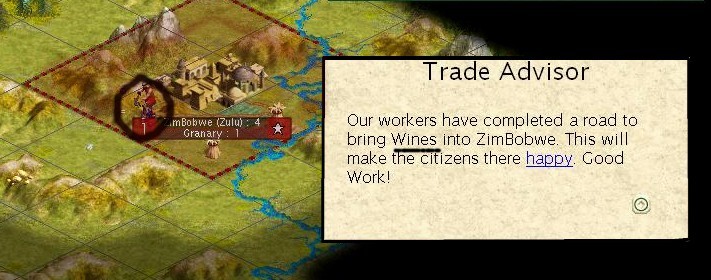
Good luck had shined its happy face upon the Zulu people, and upon Cheif Bob. To the northwest of ZimBobwe, it had been found that the grapes in the hills could be crushed and made into an intoxicating drink called wine. This wine made the people happy because now they didn't have to worry about their problems; they could just drink them away! Clearly they were on to something. But not just the wine, there was more good luck in store for the Zulu people.
But first, a short break for some more serious history. At about this time, it believed that Cheif Bob appointed his High Council. This Council would advise him on six fronts: Military, Science, Trade, Domestic, Foreign, and Cultural. These, of course, were not the names of the divisions, but each advisor had his or her own job to do and was appointed to assist the Cheif in his ruling and to advise him in their area of expertise.
The Northern Scouts had found good things to the north, and reported back to ZimBobwe to tell Cheif Bob of their findings. At this time, there was no cartographer in ZimBobwe, but this is an artist's rendering of what the scouts found:
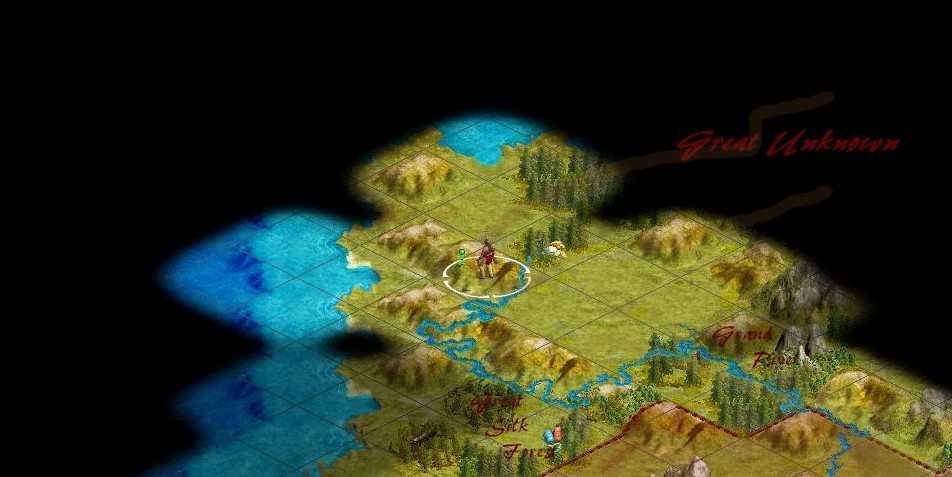
To the northwest of ZimBobwe, the Great Silk Forest, which still stands today, covered most of the land. In this forest, there resided tiny insects. When they went through their larval stage, they could be cooked and spun into a fine, smooth fabric called silk. Also in these forests there resided animals with fine furs. Both the furs and the silks would make the Zulu people happy, because now they didn't have to deal with their problems, they could just wrap them up in expensive clothes! Or something...
Soon after the scouts discovered this fine forests in the north, they found more good fortune, once again in the form of a friendly minor tribe.

This tribe called themselves Bactrians, and they showed the scouts the art of the warrior code. Using this code, the Bactrians disciplined their fighters to the greatest degree, teaching them to fight using teamwork and the honor system. This code would also allow the Bactrians to equip their warriors with a bow and arrow, and through contact with this tribe, the Zulu people now had the ability to do the same.
Next Chapter: Expansion of the Zulu Empire

Settings:
Random opponents, Warlord modded to a bit more difficult, Normal Aggression, "standard" world.
Chapter One: The Beginning
Many people say that the Zulu empire was the first true civilization, the first point at which cro-magnon man crossed the fine line into intelligence and rational thought. Until recently, not much was known of the Zulu empire or how it came to be. All that was known was that which was found in the ruins of their great cities. But now, a veritable treasure trove of evidence has been discovered. This evidence is in the form of letters of correspondence, maps, plans, and journal entries. I will relate these to you as best I can.
Nobody is sure exactly when the Zulu empire began, but most estimates point to around 4000 B.C. Around this time, the ancient Zulu scripts say, there was a weak city, nothing more than a miniature sprawl of tents and huts, huddled together among a hilly landscape. This city, however weak it was, is the first known sign of true civilization. In this city, people came together and settled down, subsisting on crops instead of following their favorite game around as they had for so many years. This city was named after the man who would soon shape it into a great pillar of civilization. This city was called ZimBobwe, which translates literally into English as "City of the Bob."
The man who was responsible for the rise to greatness of the Zulu empire is a mysterious figure. Until the Zulu empire began to become a superpower, not much is recorded of this man in terms of...his name. The only times his name is written down, it translates into English text as this: Mbawmb. Various historians and linguists have proposed the pronunciation of this name as um-BAW-UM-be, um-BAW-b, and even UM-ba-WUM-ba. Umbawumba? I don't think so. As a rule, most historians agree use the simplified pronunciation of Bob when discussing this great man.
But enough about his name. Bob brought the Zulu empire to power, and he started this the way these things always start: from the bottom. He was a simple warrior/hunter for his people when they settled on the fertile plain of the Grand River, but soon tales of his bravery and intelligence spread, and when the people decided to stay put for good, he was the natural selection as the "big man" of the city. Bob ended interclan bickering, promoted settlement of the surrounding land, and supervised all expansion of the fledgling city. It is widely accepted that if this man had not risen to be ruler of the Zulu, they probably would have died out like so many other nameless ancient clans.
Soon after the city was founded, Bob began to think to himself about what was going on over the ridges of the surrounding hills. To find out, he sent scouts to inspect the surrounding lands.
The scouts stumbled upon good fortune in the form of a small, minor tribe in the neighboring valley. This tribe greeted the scouts and, after exchanging some small talk, bestowed upon the scouts the traditions of ceremonial burial in exchange for some small beads and other trinkets of little value. The scouts raced back to ZimBobwe to inform Cheif Bob of this interesting and alien concept. The Zulu people found the practice of burying their dead wildly preferable to the previous method of tossing bodies in a pit and lighting them on fire.
Good luck had shined its happy face upon the Zulu people, and upon Cheif Bob. To the northwest of ZimBobwe, it had been found that the grapes in the hills could be crushed and made into an intoxicating drink called wine. This wine made the people happy because now they didn't have to worry about their problems; they could just drink them away! Clearly they were on to something. But not just the wine, there was more good luck in store for the Zulu people.
But first, a short break for some more serious history. At about this time, it believed that Cheif Bob appointed his High Council. This Council would advise him on six fronts: Military, Science, Trade, Domestic, Foreign, and Cultural. These, of course, were not the names of the divisions, but each advisor had his or her own job to do and was appointed to assist the Cheif in his ruling and to advise him in their area of expertise.
The Northern Scouts had found good things to the north, and reported back to ZimBobwe to tell Cheif Bob of their findings. At this time, there was no cartographer in ZimBobwe, but this is an artist's rendering of what the scouts found:
To the northwest of ZimBobwe, the Great Silk Forest, which still stands today, covered most of the land. In this forest, there resided tiny insects. When they went through their larval stage, they could be cooked and spun into a fine, smooth fabric called silk. Also in these forests there resided animals with fine furs. Both the furs and the silks would make the Zulu people happy, because now they didn't have to deal with their problems, they could just wrap them up in expensive clothes! Or something...
Soon after the scouts discovered this fine forests in the north, they found more good fortune, once again in the form of a friendly minor tribe.
This tribe called themselves Bactrians, and they showed the scouts the art of the warrior code. Using this code, the Bactrians disciplined their fighters to the greatest degree, teaching them to fight using teamwork and the honor system. This code would also allow the Bactrians to equip their warriors with a bow and arrow, and through contact with this tribe, the Zulu people now had the ability to do the same.
Next Chapter: Expansion of the Zulu Empire

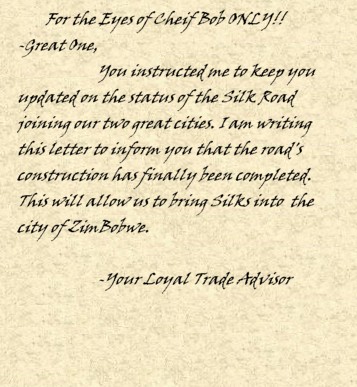
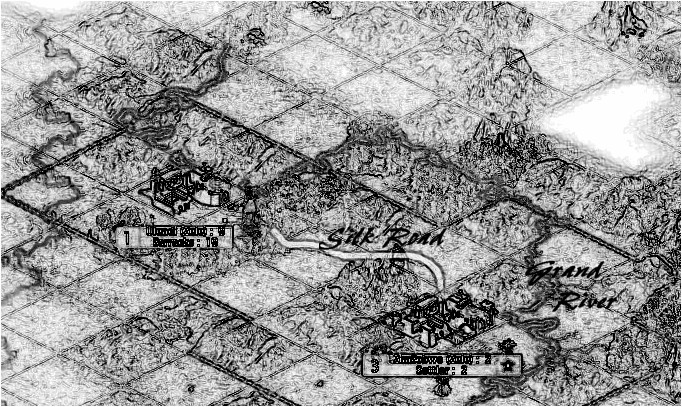
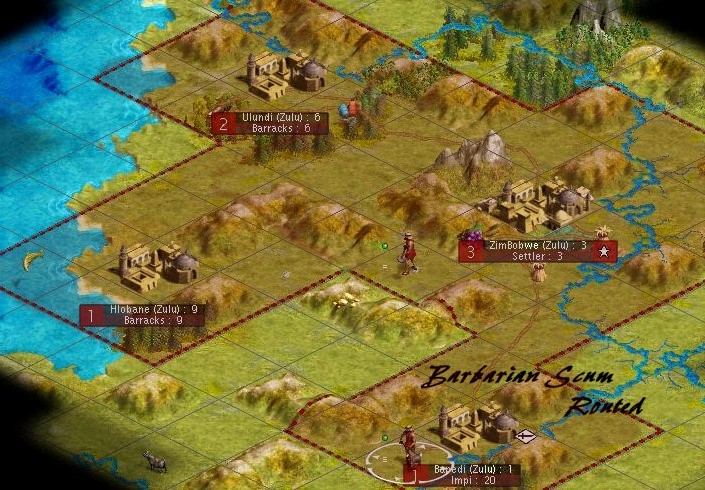
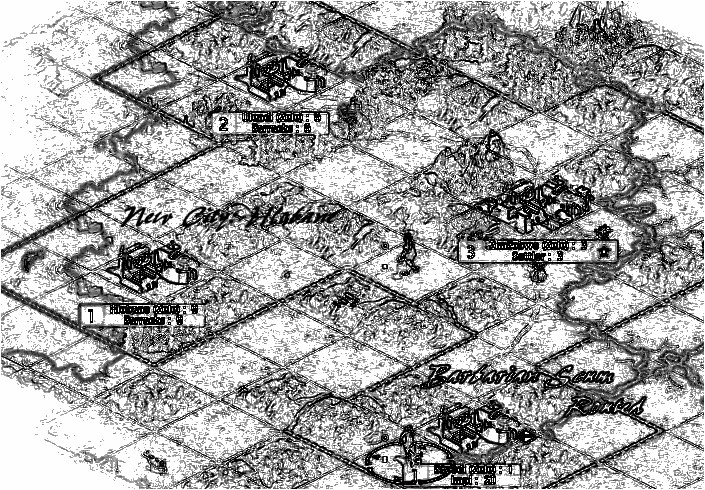

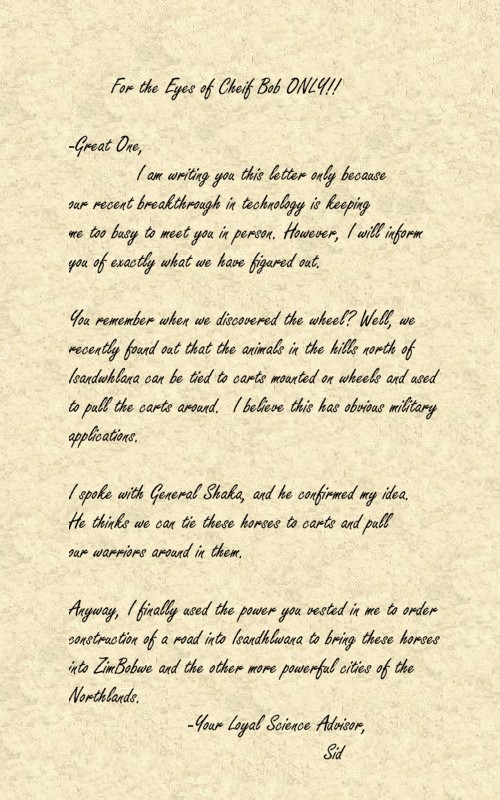
 Otherwise, good work!
Otherwise, good work!
